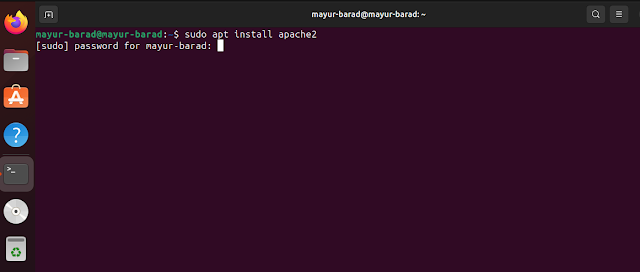Comprehensive Guide to PHP, Apache, and MySQL Installation on Ubuntu
Step-by-Step Guide : Installing PHP with Apache Server and MySql on Ubuntu.
Welcome to my comprehensive guide on setting up a web development environment with PHP, Apache, and MySql on your Ubuntu machine. This tutorial will walk you through each step, allowing you to create web applications effortlessly.
Open a terminal and ensure your system is up to date.
In terminal write following commands:
1) Install Apache Web Server
Apache is a popular web server. Install it using command `sudo apt install apache2`
After writing command enter your password and press Enter.
Note : it won't show password.
it will ask to continue - press y and Enter.
now files will start downloading.
2) Verify Apache Server
After installation, start Apache and check its status by writing command `sudo systemctl start apache2`
after writing command Open a web browser and navigate to 'https://localhost/' to ensure Apache is running. You should see the default Apache landing page.
3) Install PHP and Modules
Install PHP and necessary modules for Apache and MySql :
`sudo apt install libapache2-mod-php -y`
Now restart apache server by writing command :
`sudo systemctl restart apache2`
4) Verify PHP installation
to test php write command :
`sudo gnome-text-editor var/www/html/phpinfo.php`
This will open gnome-text-editor
In text-editor write <?php phpinfo() ?> and save it.
Now open a brwoser and write `localhost/phpinfo.php`
5) Install MySql Server
Open a terminal again and write below following command to install MySql.
`sudo apt install mysql-server`
Congratulations! You've successfully set up PHP with Apache server and MySql on your Ubuntu machine.
Here's a Sample Demo Program :
Open a terminal and navigate to the desired directory where you want to create PHP file using
`cd /var/www/html/`
Create a new file and save it with a `.php` extension by writing
`sudo touch demo.php`
open gnome-text-editor
`sudo gnome-text-editor /var/www/html/demo.php`
Inside php file,
Now run PHP script by typing :
`php demo.php`














Comments
Post a Comment